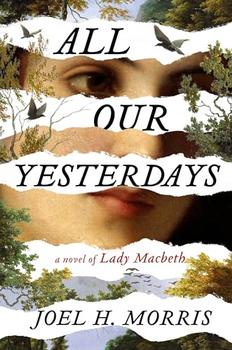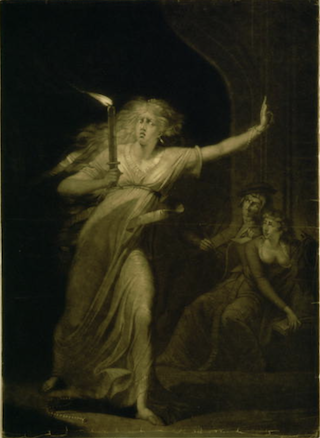Summary | Excerpt | Reading Guide | Reviews | Beyond the Book | Read-Alikes | Genres & Themes | Author Bio

This article relates to All Our Yesterdays
 Joel H. Morris's novel All Our Yesterdays imagines the lives of Macbeth and his wife, Lady Macbeth, before the events that unfold in Shakespeare's tragedy. Many are familiar with the tale but may not realize the couple are based on individuals who really did live in what is now Scotland during the eleventh century.
Joel H. Morris's novel All Our Yesterdays imagines the lives of Macbeth and his wife, Lady Macbeth, before the events that unfold in Shakespeare's tragedy. Many are familiar with the tale but may not realize the couple are based on individuals who really did live in what is now Scotland during the eleventh century.
Scotland was known as the Kingdom of Alba from 900 to 1286 CE, and Macbeth (Mac Bethad mac Findláech, c. 1005–1057 CE) and his wife Gruoch (born c. 1015, death unknown) were both descended from Alba royalty through the line of Malcolm I (Máel Coluim mac Domnaill, d. 954).
Malcom had two sons who succeeded him: Duff (Dub mac Maíl Coluim, reigned 962–967) and Kenneth II (Cináed mac Maíl Coluim, 971–995). The kingdom changed hands several times as the branches of the family fought for control, with the Duncan of Shakespeare's play, Donnchad mac Crinain, ascending to the throne in 1034 CE. Both Duncan and Macbeth were descended from Kenneth II, but Duncan was born from one of Kenneth's grandsons while Macbeth was sired by a granddaughter, making Duncan's claim the stronger one. Gruoch, on the other hand, came from the line of Duff, making her Macbeth's distant cousin.
Gruoch was wed to Gillacomgain sometime before 1032, and the two had a son, Lulach. Not much is known about Gillacomgain before 1020, when it's recorded that he killed his uncle Findláech (Macbeth's father), becoming mormaer (ruler) of Moray. The territory was a large one, centered on modern-day Inverness, and was a strategically important buffer zone between the Kingdom of Alba and hostile forces to the north, the Norsemen. Historical records indicate Gillacomgain was burned to death in 1032 in a hall with 50 of his men (no mention of the guilty party or parties), at which point Macbeth reclaimed the lands and the title Gillacomgain took from his (Macbeth's) father. He also married Gillacomgain's widow, Gruoch, uniting the two branches of the family and strengthening his own claim.
Duncan became King of Alba in 1034. Unlike Shakespeare's Duncan, who's described as old and wise and is the victim of treachery, the real-life Duncan was 33 when he ascended to the throne and was considered a weak, ineffective leader. He led forays south into England but was repelled. He then invaded Moray—Macbeth's territory—and was killed in the Battle of Pitgaveny in 1040. It's not specified by whom, but he certainly wasn't murdered in his sleep under Macbeth's roof, as is depicted in the play. Macbeth became King of Alba as a result of Duncan's death, with Gruoch his queen.
Although Shakespeare portrays Macbeth as evil and a poor ruler, historical evidence suggests the opposite. His reign was mostly peaceful, and he was known as a generous supporter of the church. He ruled for 17 years, and his kingdom was sufficiently secure that he was able to go on pilgrimage to Rome in 1050. He and Gruoch didn't have any children, so he adopted Lulach and declared him his heir.
Very little is known about Gruoch—Lady Macbeth—and there's no indication of what kind of person she may have been. Her reputation as being ruthlessly evil is purely Shakespeare's invention. There's also no indication she died by suicide, as the Bard maintained.
On July 27, 1054, Duncan's elder son Malcolm, who'd been living in exile in the court of Edward the Confessor, King of England, launched an attack against Macbeth at Dunsinane, where Macbeth's forces were defeated. Macbeth retreated north, but Malcolm continued his pursuit for more than three years, culminating in the Battle of Lumphanan on August 15, 1057. Macbeth was wounded there and later died. His stepson, Lulach, had enough support to briefly be declared king in Macbeth's place, but a year later he, too, was killed in battle with Malcolm's forces, securing Malcolm's claim to the throne of Scotland. Macbeth and Lulach (and possibly Gruoch as well) were buried on the isle of Iona, a tiny island in the Inner Hebrides where many of Scotland's medieval kings are laid to rest.
Lady Macbeth, painted by Henry Fuseli and engraved by John Raphael Smith, 1784, courtesy of Library of Congress
Filed under People, Eras & Events
![]() This article relates to All Our Yesterdays.
It first ran in the March 20, 2024
issue of BookBrowse Recommends.
This article relates to All Our Yesterdays.
It first ran in the March 20, 2024
issue of BookBrowse Recommends.
Your guide toexceptional books
BookBrowse seeks out and recommends the best in contemporary fiction and nonfiction—books that not only engage and entertain but also deepen our understanding of ourselves and the world around us.